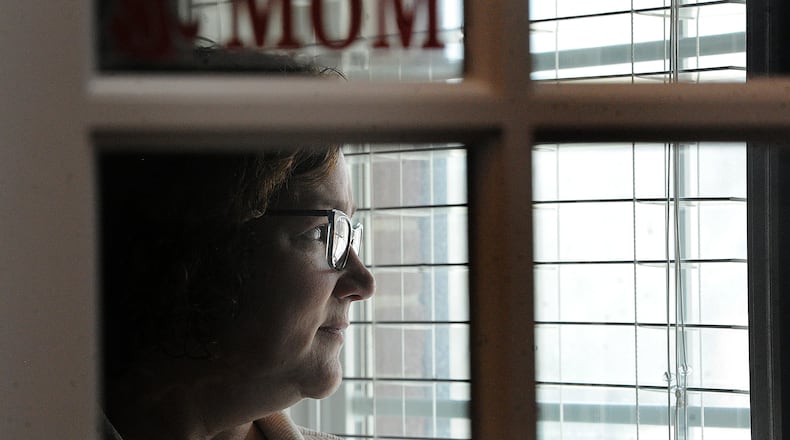“I wanted to be very supportive of her,” said Russell, of Miamisburg.
Prior to transitioning, her daughter felt her body didn’t fit her. It was like it was somebody else’s body, Russell said.
“She was really depressed, and she did think about suicide,” Russell said.
When they set an appointment for Cincinnati Children’s Transgender Health Center, her daughter’s mood lifted instantly, Russell said.
“I think she just began to feel more like herself,” Russell said about when her daughter was able to start taking hormones. She said her daughter would have also likely preferred to access gender-affirming before going through puberty.
‘They just want to be happy’
One adult child of local mother Andrea Cobb, of Centerville, came out as transgender and nonbinary in college.
Over the course of four years and time spent in therapy, Cobb’s adult child realized they needed to be who they are.
After that, Cobb’s child went from being quiet and reserved to happy, smiling and hugging others, she said.
Cobb’s child had experienced suicidal thoughts previously before coming out. When their child did come out and began hormone replacement therapy, it was like they had come into their identity, she said.
“It is the person I remember them being as a child, but I didn’t see that person for a very long time,” Cobb said.
Cobb also feels her child would have wanted to access gender-affirming care sooner if they had known how to voice the gender dysphoria they felt, she said.
Cobb has connected with other parents of people in the LGBTQ+ community, saying she knows mothers who lost their children to suicide.
“Transgender people just want to live their lives,” Cobb said. “They just want to live, and they just want to be happy.”
Rachel Sommerkorn, of Kettering, is among the parents left wondering why legislators are involved in these medical decisions.
“That makes me angry. Me and my husband both,” Sommerkorn said.
Her son has not yet accessed gender-affirming medical care, such as puberty blockers or hormones, so they are likely to be excluded from the legacy clause in H.B. 68.
What’s happening to transgender youth is not what America wants, Sommerkorn said.
“The vast majority of people, almost all people we have came into contact with our child, are respectful,” she said. “Maybe they don’t always understand, but they see a child. They see a child who wants to play. They see a child who wants to learn. They see a child at the end of the day, and they respect that.”
Kids are ‘terrified’
Kids and young adults in the region are “terrified” about the upcoming ban on gender-affirming care for minors, professionals and allies in the community have said.
“We want you to stay alive,” said Richelle Frabotta, LGBTQ+ health initiatives project manager at Public Health - Dayton and Montgomery County, about one of the top priorities for the LGBTQ+ youth.
Individuals in the LGBTQ+ community face more health disparities, so Public Health’s Visible and Resilient prevention education services project is geared toward LGBTQ+ youth and allies to help prevent negative health outcomes.
“I’m seeing that most of the youth we provide services to, middle school through high school, are gender nonbinary, gender fluid, and/or identify as transgender,” said Frabotta, who has been a sexuality educator for more than three decades.
“They’re terrified,” Frabotta said about how the youth they work with are responding to H.B. 68. “As a group, and everybody’s in a different spot...Overall, they’re scared, and they’re pissed. They’re angry, and they’re frustrated.”
She described how kids are feeling both invisible to society, but also now they’re being told that they’re invisible to medical providers, as well.
Transgender adults share experiences
Some adults who are transgender began receiving gender-affirming care as minors, while others did not. When they did start accessing this type of care, those who spoke with the Dayton Daily News say it improved their mental health.
Chester Stander, of Hamilton, started his hormone replacement therapy as a teenager, beginning testosterone at 16.
Being able to take hormones helped Stander feel more like himself, treat the distress he felt because of his gender dysphoria and keep him safe when out in public.
“It made things a lot easier for me because I’ve experienced a lot of transphobic harassment, even assault, and just being able to pass as a man, it made me so much safer,” Stander said.
Stander realized he was transgender at 10 years old, saying he remembered experiencing gender dysphoria at around 8, when he started going through puberty.
Gender-affirming care was the light at the end of the tunnel for him, he said.
“It also just made me feel so much more comfortable in my body,” Stander said.
His mental health immediately improved when starting testosterone, he said.
Other transgender adults who weren’t able to start using gender-affirming care as minors, like puberty blockers or hormone replacement therapy, have said they wish they could have accessed it sooner.
“Absolutely,” said Paul White, of the Dayton region.
If he had the language for the gender dysphoria he was experiencing and what it meant to be transgender, White said puberty blockers would have made sense for him.
“When I was a kid, it would have allowed me to make sense of the world when the world didn’t make sense the way I was living it,” he said.
About the Author

